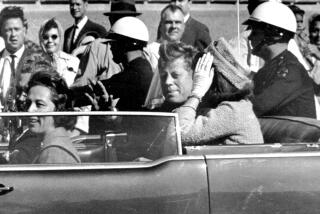Torture’s blame game
Who done it?
Sometime late in 2005, the CIA destroyed videotapes showing hundreds of hours of interrogations of two top Al Qaeda suspects -- while continuing to imply to the 9/11 commission and the courts that no such interrogation tapes had ever existed.
What was on those tapes that made CIA officials so eager to destroy them, instead of just selling them to the producers of “24” and retiring in comfort? And who authorized (or knew of) their destruction?
Not our national Decider, who insists, via White House spokeswoman Dana Perino, that he didn’t decide anything whatsoever, because he has “no recollection of being made aware of the tapes or their destruction.” That’s in contrast to former White House Counsel Harriet E. Miers, who apparently knew all about the tapes but didn’t bother to share the news with her boss.
Unidentified administration sources assure us, though, that Miers recommended that the CIA preserve the tapes. (It’s not hard to imagine her words: “Gee, if these interrogation tapes just happened to be lost or destroyed, it would sure make it tough for anyone to bring future war crimes or torture prosecutions against anyone in this administration, so I hope the CIA will take really good care of those tapes.”)
Over at the CIA, another unidentified “former official” said no one at the White House ever ordered the CIA not to destroy the tapes -- at least not in so many words: “They never told us, ‘Hell, no,’ ” he told the New York Times. And current and former officials said that the CIA’s acting general counsel, John Rizzo, was in on the whole discussion about the tapes. Meanwhile, still another anonymous “official” asserted that Rizzo was out of the loop and “angry” at the tapes’ destruction.
When it was his turn to pass the buck, current CIA Director Michael V. Hayden helpfully reminded Congress that he wasn’t even at the CIA in 2005 and therefore had no idea who ordered that the tapes be destroyed, though he naturally intends to look into it.
As the president told ABC News, “It will be interesting to know what the true facts are.” Uh-huh. But in many ways, the question of who ordered that the tapes be destroyed completely misses the point. It probably won’t be all that difficult to answer that question -- congressional inquiries are fairly good at that sort of thing. We may even see some prosecutions come out of this, because the tapes were, arguably, crucial evidence in criminal prosecutions and other legal proceedings. Those who want heads to roll for this will probably get their way.
But so what? In this case, as blogger and Georgetown professor Marty Lederman reminds us: “The cover-up is not worse than the crime, and they knew it. Those tapes must have depicted pretty gruesome evidence of serious criminal conduct.” Waterboarding? For sure, according both to press accounts and to former CIA operative John Kiriakou. Other “enhanced” forms of interrogation that, to the unenhanced eye, would look indistinguishable from plain torture? It’s a pretty good bet. If I had to guess, the tapes were destroyed because obstruction-of-justice charges are no big deal compared to war crimes charges.
After we find out who authorized the destruction of the tapes, the true who-done-it will remain: Who gave the CIA the green light to use interrogation methods that the agency surely suspected were criminal? Who decided to let the U.S. adopt the interrogation methods of a hundred tin-pot dictators?
Answering that one will be far more uncomfortable. It would be nice to find a scapegoat (Aha! It was Dick Cheney!), but the unpleasant truth is that the blame is pretty widespread.
So ... who really done it?
Cheney, presumably, and the sinister little gnomes on his staff, and the checked-out Decider, who either knew and didn’t care, or didn’t care to know. And the CIA leadership and a whole cadre of operatives, who were willing to try a long list of discredited shortcuts they could borrow from our enemies. And blame the conservative punditocracy, which eagerly defended enhanced interrogation methods. And let’s not forget the GOP leadership in Congress, which gave the administration a whole book of blank checks.
But save some blame for House Speaker Nancy Pelosi, who apparently uttered not a word of dismay when briefed in 2002 on enhanced interrogation methods that included waterboarding, and for quite a few other congressional Democrats as well, who thought that ignoring and overlooking administration criminality was a legitimate form of congressional oversight. And we can blame ourselves too, collectively. After all, we’re the nation that made “24” a hit show.
How does a democracy come to adopt a policy of torturing detainees? To paraphrase Hillary Clinton, it takes a village.
--
More to Read
Get the L.A. Times Politics newsletter
Deeply reported insights into legislation, politics and policy from Sacramento, Washington and beyond. In your inbox three times per week.
You may occasionally receive promotional content from the Los Angeles Times.










